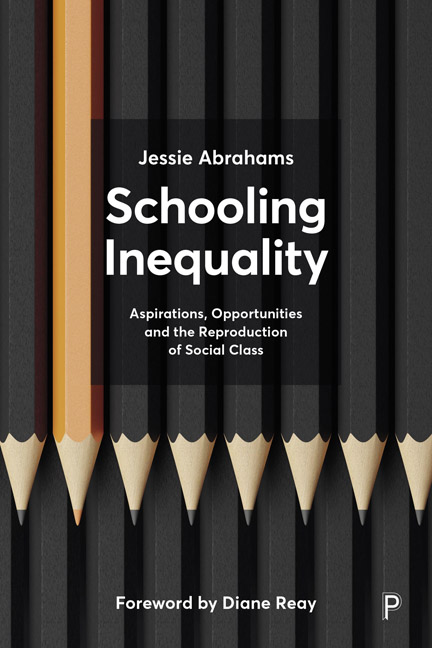Book contents
- Frontmatter
- Dedication
- Contents
- List of figures and tables
- List of abbreviations
- Acknowledgements
- Foreword
- Introduction
- 1 Reproduction: social class inequality in education
- 2 The three schools
- 3 Aspiration, aspiration, aspiration: “The only thing they’ve forced me to do is keep my options open”
- 4 Knowledge, familiarity and physical proximity: “Everyone in my family has gone to university, I don’t see why I shouldn’t”
- 5 Option blocks that block options (GCSEs)
- 6 Packages, facilitating subjects and ‘keeping the options open’ (A levels)
- 7 Institutional concerted cultivation
- 8 Aim lower: leashing aspirations and internalising notions of (in)ability
- 9 Jake’s story: a journey to reflexivity
- Conclusion
- Appendix I Questionnaire
- Appendix II Parental Standard Occupational Classification 2010 groups
- Appendix III Grand Hill Grammar careers event question sheet
- Appendix IV Vignette sample
- Notes
- References
- Index
Conclusion
Published online by Cambridge University Press: 18 December 2024
- Frontmatter
- Dedication
- Contents
- List of figures and tables
- List of abbreviations
- Acknowledgements
- Foreword
- Introduction
- 1 Reproduction: social class inequality in education
- 2 The three schools
- 3 Aspiration, aspiration, aspiration: “The only thing they’ve forced me to do is keep my options open”
- 4 Knowledge, familiarity and physical proximity: “Everyone in my family has gone to university, I don’t see why I shouldn’t”
- 5 Option blocks that block options (GCSEs)
- 6 Packages, facilitating subjects and ‘keeping the options open’ (A levels)
- 7 Institutional concerted cultivation
- 8 Aim lower: leashing aspirations and internalising notions of (in)ability
- 9 Jake’s story: a journey to reflexivity
- Conclusion
- Appendix I Questionnaire
- Appendix II Parental Standard Occupational Classification 2010 groups
- Appendix III Grand Hill Grammar careers event question sheet
- Appendix IV Vignette sample
- Notes
- References
- Index
Summary
You’ve got to get out there and find people, win them over, get them to raise aspirations, get them to think they can get all the way to the top.
(David Cameron cited in BBC, 2013)Amidst a climate of intensive aspiration-raising policies sit three schools, each one housing young people from different social-class backgrounds, yet each one equally full to the brim of pupils bursting with aspirations, hopes and dreams for a ‘brighter future’. These schools, however, do not equally enable any possible future for any possible student. Through their unique resources (material and symbolic), structures and practices these different schools work to distinguish some young people from the rest. Thus, in response to the quote that opens this chapter, I would pose the question to David Cameron: ‘And then what?’ What is the outcome of encouraging a generation of young people to ‘think they can get all the way to the top’ without investing material resources in them, without ensuring that they all have the tools to fulfil these aspirations? This book has engaged with this question as it sought to investigate the experiences of young people in three contrasting schools as they envisioned their futures in the context of a deep political rhetoric around aiming high yet unequally armed with the opportunities to see their dreams come to fruition. How did they construct their ‘aspirations’ in line with such discourses? How did they experience school systems which ‘block’ (or indeed ‘un-block’) certain pathways? And finally, how did the institutions respond to the contradiction inherent in the policy agenda; how do you manage aspirations when everyone wants a ticket for the same future but only limited seats are available on the train?
This book has unpacked the contemporary ways in which the English secondary education system reproduces social class inequalities through its structures and practices. It has done so in several ways. First, it has contributed to the literature on aspirations by paying attention to the ways in which aspirations and habitus are constructed in different contexts and at different stages (Chapters 3 and 4). Second, it has demonstrated the powerful ways in which institutional structures and practices intervene and interact with young people's agency, further restricting disadvantaged young people's ‘choices’ and career pathways (Chapters 5 and 6).
- Type
- Chapter
- Information
- Schooling InequalityAspirations, Opportunities and the Reproduction of Social Class, pp. 137 - 149Publisher: Bristol University PressPrint publication year: 2024

